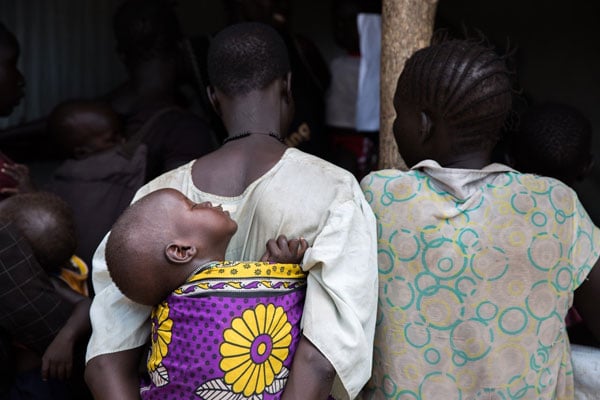Livelihood project transforms refugees, locals in West Nile

South Sudanese refugees at the reception centre of Palorinya Refugee Settlement Camp in Moyo District. FILE/PHOTO
What you need to know:
- The four-year project was implemented in the districts of Omugo, Obongi, Moyo and Madi Okollo.
About five years ago, Mr Moses Yeka, a South Sudanese refugee from Omugo settlement in Terego District, depended mainly on the food rations from the World Food Programme (WFP).
Mr Yeka says the food ration from the WFP could last for a few days before his family would start sleeping hungry.
However, two years ago, Mr Yeka’s life changed when he was selected to benefit from the Security, Protection and Economic Empowerment (SUPREME) Project with funding from the European Union.
“After my selection, I came up with a business plan for rearing poultry, which was approved. I was given a cash grant of Shs4.5 million in October 2020 and I used the money to buy 300 chicks in the first batch,” he says.
“From the period I started this poultry business up to now, I have sold more than 4,000 chicks that have earned me more than Shs4 million,” he adds.
Mr Yeka explains that the poultry business has made him address the issue of a balanced diet, and payment of school fees for his children, among others.
Similarly, Mr Adam Asio, 47, a member of the host community from Gimara Sub-county in Obongi District, started cassava production as a business four years ago.
“I chose cassava growing as an enterprise, wrote a proposal and submitted it for funding. In the proposal, I intended to have 10 acres of cassava and then received Shs7 million for the project,” he says.
He adds: “I planted Narocas 1 cassava type on the 10 acres in the first season and harvested 68 bags, which earned me Shs18 million.”
Besides the cassava business, he now owns 30 heads of cattle and more than 60 goats, adding that the project has made him educate his children and that the food security in the family is guaranteed.

In this photo, refugees are seen in Palorinya camp in Moyo District. PHOTO/FILE
The SUPREME Project is being implemented by World Vision, the lead, SNV, ZOA and Rural Initiative for Community Empowerment (RICE West Nile).
The European Union injected Euros 9.7 million into the project while the above partners contributed Euros 2.1 million.
Beneficiaries
The four-year project was implemented in the districts of Omugo, Obongi, Moyo and Madi Okollo.
Speaking during the closure of the project in Arua City on Friday, Mr Noel Alabi, the SUPREME consortium programme manager, said they intended to improve livelihoods of refugees and the host communities.
“With the funding, we reached 27,372 direct refugee and host participants whom we organised in 1,000 savings and development clusters (SDCs), 2034 youths who trained in vocational skills and engaged 50 private sector entities to deliver on market linkages,” he said.
He added: “We noticed that 60.7 per cent of the beneficiaries have diversified their sources of income. Also, a number of them were acquiring productive assets that enabled them to generate income such as motorcycles for boda boda business, and livestock assets such as goats, cattle and chicken.”
Terego District chairperson Wilfred Saka said: “Since the project has ended, the partners have left the beneficiaries in our hands. We should continue to empower them.”




